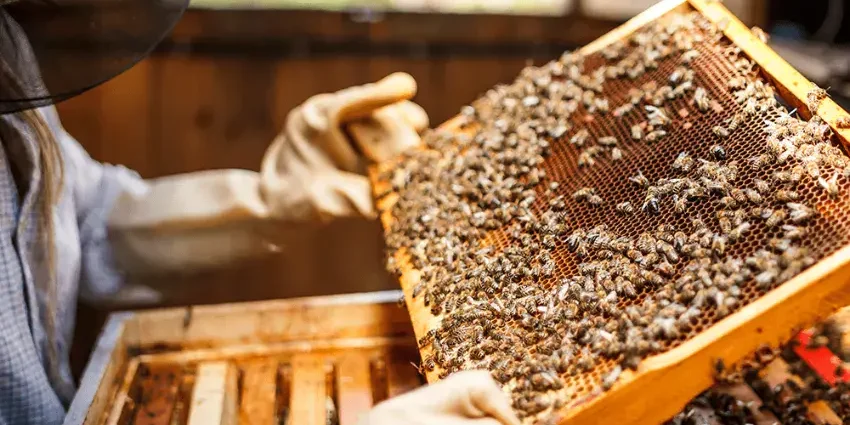Contents
Beekeeping as a business is one of the few almost win-win activities in agriculture. There is always a demand for products produced by bees. Of course, commercial beekeeping already requires certain skills and knowledge. You can’t go into beekeeping as a serious business without knowing anything about bees. But a similar situation exists in any field of agriculture: before you engage in animal husbandry or crop production, you need to gain experience.
Breeding bees as a business: profitable or not
A person will always pay for food. But growing food is a high-risk area: crop failures, epizootics can knock down a farmer. For treatment, people will give their last money. In the field of agriculture, such a business as beekeeping is one of the most profitable industries, as it combines both food and medicine.
With a competent approach, keeping an apiary as a business is no more risky than a poultry farm. But investments are needed much less. Moreover, even an apiary needs less space than any more or less serious farm.
It is also beneficial to keep bees because absolutely all bee products are used. Warehouses for food in beekeeping is not required. If the owners of livestock and poultry farms need to think about where to keep food and where to put waste, then the beekeeper receives income from the sale of propolis and tinctures from it.
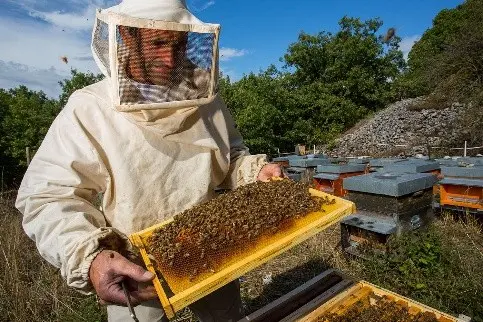
Profitability of beekeeping
Profitability is not quite what is meant by this in everyday conversations. Profitability is a ratio that is defined as profit divided by …
But what the profit will be divided into, and whether this profit should be net, depends on what kind of profitability should be calculated.
To calculate the profitability of an apiary, you need to decide what exactly to calculate:
- the profitability of the enterprise after the initial investment is recovered;
- the cost of consumables, including the possible purchase of new families;
- seasonal profit from the sale of bee products.
The high profitability of bees as a type of business is primarily due to the fact that the initial investment in beekeeping is very low. If you have the tools, materials and skills learned in school labor lessons, you can make hives yourself. A personal plot with a garden will fit under the apiary. The most risky spending is on the purchase of bee colonies. Equipment for pumping honey, even in case of failure, can be sold.
apiary income
Earning on bees consists of many factors:
- honey;
- propolis;
- royal jelly;
- drone homogenate;
- pga;
- wax;
- tinctures from the dead.
Oddly enough, but familiar to everyone, honey is the cheapest product in beekeeping. It also has the largest price range. Therefore, the price of honey will depend on the region where the beekeeping business is planned, and the type of plants from which the product is collected.
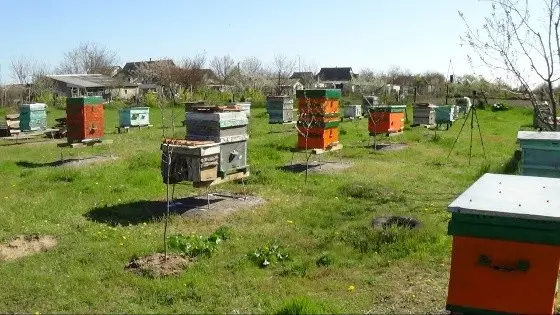
Apiary as a business: where to start
If there is no experience in beekeeping as a business, it is better to first gain it with 2-3 hives in order to understand how to properly keep bees. There are frequent cases when, due to inexperience, beekeepers destroy families with their own hands. You can think about making money in a bee apiary a couple of years after the appearance of the first hives. Moreover, bees swarm in summer, and the number of colonies can be increased without financial costs.
If you already have experience, it makes sense to immediately start by purchasing several dozen colonies. But an apiary with 10 colonies is already considered enough to make a small profit. True, she also has a high risk of extinction of all families in the event of an unfavorable combination of circumstances.
In addition to bee colonies and hives, you also need some equipment to start a beekeeping business. The latter is profitable to buy if the apiary has at least 50 colonies.
The organization of a beekeeping business and the calculation of the number of hives begins with an inspection of the proposed site. Or they come to terms with the idea of serious financial investments in the purchase of a large car trailer for organizing a nomadic apiary in advance.
Apiary placement
For their own needs, citizens can place beehives on personal plots, subject to sanitary and veterinary requirements.
For a serious business in beekeeping, there are already certain rules:
- one apiary cannot have more than 150 hives;
- a stationary apiary along the perimeter of the territory is fenced and planted with fruit trees and bushes;
- free areas are annually plowed up and sown with melliferous herbs;
- the distance between the hives should be 3-3,5 m, and between the rows – 10 m;
- a stationary apiary is placed no closer than half a kilometer from railways, power lines, sawmills, federal highways;
- it is impossible to put hives closer than 5 km of chemical enterprises. industry and confectionery, sources of microwave radiation.
First of all, when choosing a site, pay attention to these requirements. Next, the number of honey plants in the selected place is estimated.
The bees can collect the maximum bribe if they do not have to fly further than 2 km. At the same time, there should be at least 1 honey plants per 2000 hectare. This quantity includes:
- garden trees;
- meadow forbs;
- forest trees.
After assessing the possibilities for collecting honey, they already choose a place for the apiary itself. If there is no particular choice, and the apiary will be located in the garden on the plot, the hives are placed in the shade of trees. The territory for protection from the wind is surrounded by a 2-meter fence.
A stationary apiary is also equipped with rooms for storing equipment, spare hives and honey extracting equipment. Plumbing facilities should also be provided.
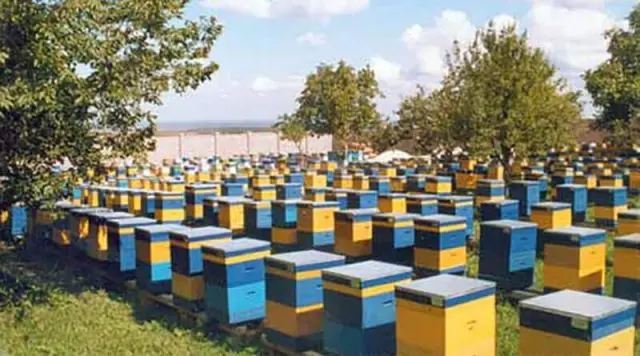
Nomadic pasture
In the absence of a suitable site for a “stationary” business, you can make a nomadic apiary, but the requirements for it are stricter:
- placement of nomadic apiaries in places of honey collection at a distance of at least 1,5 km from one another;
- at least 3 km from stationary apiaries;
- it is forbidden to place nomadic apiaries on the way of the summer of bees from another apiary to the main honey collection;
- when placed on someone else’s site, an agreement is required between the beekeeper and the owner of the land;
- the beekeeper must take measures to ensure the safety of people and animals. He is also responsible for preventing the entry of outsiders into the apiary.
Due to the global disappearance of bees and the spread of diseases among them, the owner of a nomadic business must notify the local authorities of his plans before moving to a new place. Further informing the veterinary service falls on local governments.
A nomadic apiary has an advantage over a stationary one: the owner can transport bees to the best places.
In cold regions, for both types of beekeeping business, it is necessary to provide a ventilated winter house, in which it will be possible to maintain a temperature of 0-6 ° C and a humidity of no more than 85%.
For both types of apiary, a flat area overgrown with trees with a slight slope is chosen. Trees are needed to hide the beehives from the heat in the shade.
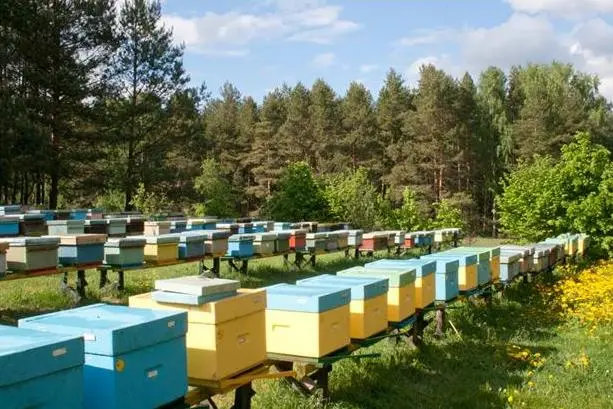
Hives and necessary equipment
According to reviews in the business of bees, the main expense item is hives. Even a bee colony is cheaper than a quality hive. The cost of a “house for bees” is about 4000 rubles. The hive must be made of quality wood.
The resin released in the heat will “glue” the bees to the walls. A good option is aspen, which is difficult to rot.
Do not use plywood hives. From water, this material will exfoliate and warp. Foreign attempts to use polystyrene instead of wood also failed: such a material turned out to be too light and fragile, although it is ideal from the point of view of thermal insulation.
In addition to hives, you will also need a lot of things that may not be taken into account when calculating business costs:
- frames;
- beekeeper suit;
- smoker
- swarm net;
- veterinary preparations for the treatment of families;
- wax
- honey extractor;
- wax production equipment;
- smoker material;
- special cages for queen bees;
- various carpentry tools.
The latter can be found in any subsidiary farm. Foundation equipment can also be bought later, when it becomes clear that the business has come out of a loss-making stage. But you can get by by buying foundation in the store.
Purchase of bee colonies
When buying colonies, you need to take into account the species composition of honey plants near the apiary and climatic conditions. Today, there are quite a few breeds of bees that work better on certain plants:
- Central bees: linden and buckwheat. Aggressive and prone to swarming.
- Gray Caucasians are not aggressive, but they do not tolerate cold well. They work well on clover and meadow forbs. They don’t steal honey, they don’t let strangers into their hives. This breed is unproductive.
- Ukrainian steppe is preferred for linden, buckwheat, sunflowers, and other honey plants. They tolerate winter well and are resistant to nosematosis and European foulbrood.
These breeds are the most common in beekeeping. In addition to them, you can buy local bees or their crosses with other breeds. For beekeeping, the advantage of local breeds is their good adaptation to a particular climate, but productivity can be low.
The cost of bee colonies is about 2000 rubles. But depending on the pedigree of the colony, it can be higher.
Apiary work
At first glance, the apiary is a very calm and easy job. In fact, according to the opinions of people involved in beekeeping as a business, apart from work in the apiary, there is no time left for anything else. In this business, worries begin in early spring, when it is necessary to transplant bees into clean hives, and last until autumn.
During the season in the apiary, it is necessary to periodically mow the grass so that it does not cover the entrances. In front of the hives, platforms of 0,5×0,5 m are equipped, on which the bees throw dead dead and other garbage. These sites must be cleared of debris. In the season, drone brood is collected for homogenate and royal jelly.
In autumn, families are audited and decide how many colonies to leave for the winter. You also need to collect mature honey, propolis and bee bread.
For the winter, the hives must be placed in a winter hut. If the climate allows and the bees tolerate the cold well, the colonies can be left to winter in the open. In winter, the beekeeper also has something to do:
- check and clean reserve hives;
- repaint them all;
- make frames;
- make wax.
But in winter the work is less intense than in the season.
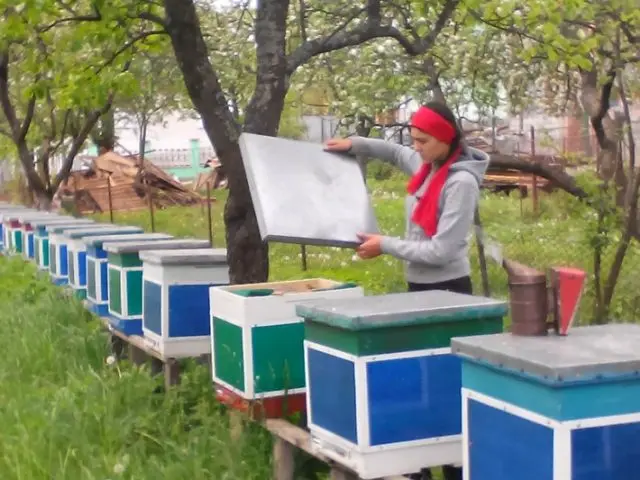
Start-up capital
In a beekeeping business, the initial costs largely depend on:
- apiary size;
- a plot of land under it;
- land owned or leased;
- stationary apiary or nomadic;
- the cost of processing all documents.
With the maximum possible size of 150 hives, the initial costs can reach 2 million rubles. If the business starts with 5-10 beehives on your own garden plot, then the costs are minimal (40-70 thousand rubles), but the income will also be small.
To transport the hives closer to the honey plants, you will need a trailer. These are the costs in beekeeping, which will not be in the case of a stationary apiary.
Is there a risk
There is no business without risk. The bee apiary as a business object is no exception. Bees can get sick or die from frost. The year may be cold and the colonies will not get enough honey. But any farmers are in the same situation. Crop failures happen frequently.
The peculiarity of Our Country is in the cold climate, which makes beekeeping as a business difficult. In very cold winters, the colony may freeze to death. But also the bees can die if they block the ventilation with a heater.
An untimely reduction in the number of varroa mites leads to a weakening of the colony due to the breeding of parasites. Varroas suck the lymph from the bees and the insects die.
It is also necessary to monitor the occurrence of diseases in bees. Contrary to popular belief, bees suffer from invasive diseases. These infections are caused by protozoa that live in the intestines of bees.
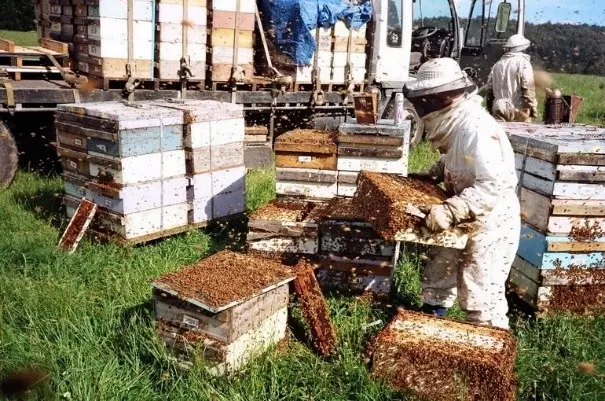
Income from beekeeping
The income from the beekeeping business, according to the beekeepers themselves, is very unpredictable. A lot depends on how strong the family is. You can only get income in this business from a strong colony. The weak will have to be fed, and the average can only provide for itself.
The maximum income for the business in beekeeping is brought by nomadic apiaries, which are taken out as close as possible to honey plants. From a strong colony with this method of beekeeping, you can get 40 kg of honey per season. At the stationary output of the product will depend on the number of honey plants in the area.
If we take the maximum yield and assume that all colonies are equally strong, then the amount of honey can simply be multiplied by the number of hives. In fact, this does not happen. Therefore, if the apiary consists of 10 hives, out of a total of 400 kg, you can safely take away about 50 kg. From 100 hives of a nomadic apiary, not 4 tons of honey will be obtained. But more than 3500 kg will come out for sure.
To calculate the income, it is enough to multiply the average output by the average price of a kilogram of honey. The cost of honey in different regions is different. Similarly, honey varieties also have different prices.
Sales of finished products
Sales in this type of business depend entirely on the resourcefulness of the beekeeper. Honey can be sold:
- by ad;
- independently in the market;
- hand over to a reseller;
- organize your own company store with your comrades.
There is another option: the union of beekeepers publishes its own free newspaper, which is distributed to mailboxes. The newspaper placed announcements about the centralized sale of honey and announced discounts on products.
Prices for honey and bee products
The price of honey varies greatly depending on its variety. Most valued:
- buckwheat;
- lime;
- acacia;
- mint.
The cost of honey ranges from 300 to 1200 rubles. Therefore, prices should be clarified at the local market. In the south, acacia honey will cost less than it does in the north.
With an apiary of 100 families and a honey yield of 3500 kg, at a minimum cost per kilogram, you can get 3500×300 = 1050 thousand rubles. With a maximum cost of 1200 rubles. you can get 4200 thousand rubles.
An amateur apiary of 10 hives will generate income after the sale of honey at a minimum price of 105 thousand rubles, at a maximum price of 420 thousand rubles.
From the hive comes out, respectively, 10,5 thousand rubles. and 42 thousand rubles. But the figures are approximate, the beekeeping business is one of the most unpredictable in terms of obtaining products.
In addition, in fact, even in the most favorable scenario, the real profit will be less. From the amount received, it is necessary to deduct the costs of maintaining the apiary and taxes.
This allows the beekeeper to hold onto the product until prices increase.
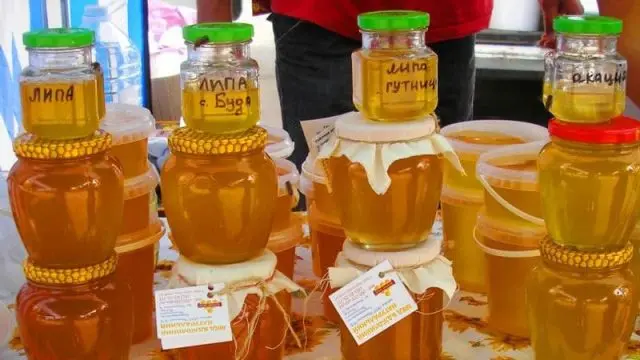
Is it profitable to engage in beekeeping: we consider profit
The beekeepers themselves traditionally complain about the lack of state support for beekeeping and the difficulties of business. Judging by the reviews of those who keep the apiary as a business, everything is very bad. But they are not ready to give up beekeeping and switch to breeding chickens, rabbits or nutria.
There are other reviews, from which it follows that a beekeeper cannot become a millionaire, but it is possible to adequately support a family by being engaged in beekeeping. Of course, you will have to work, and not sit with a cup of tea and a saucer of honey on the veranda.
Beekeeping business
Due to the frequent rejection of families, other queens are in demand in significant numbers. In addition, a bee colony is more expensive than a single queen bee. If you need to breed purebred bees, you can buy a fertilized queen and plant it in a “mongrel” family. A thoroughbred queen bought in the spring will “replace” the outbred livestock of the family in one season. Due to this, if the beekeeper has thoroughbred bees, he can sell both queens and new young swarms to others.
Selling queens as a separate type of business in beekeeping is quite profitable, since working individuals wear out quickly in summer. Their lifespan is about 30 days.
The cost of queens ranges from 600 to 950 rubles. regardless of breed. Pricing in this area rather depends on the desire of the bee owner than on objective factors.
Normally, bees need only one queen. When the former queen grows old, the colony will nurse another one, and the old one will be killed. There are usually not many queens in the hive. Therefore, if the business is aimed at obtaining honey, it will not be possible to earn much on queens. From strength to 10 thousand rubles. in year.
The same applies to the sale of bee colonies at a price of 2 thousand rubles. You can earn even less on them, since fewer new swarms are “born” than queens. In order not to weaken families, swarming is best prevented. Usually the beekeeper keeps a new swarm for himself.
The business of selling bees is carried out by specialized nurseries, for which honey is already a low-income by-product. Bees can be forced to grow many queens per season, but then they will not be able to fully collect honey.
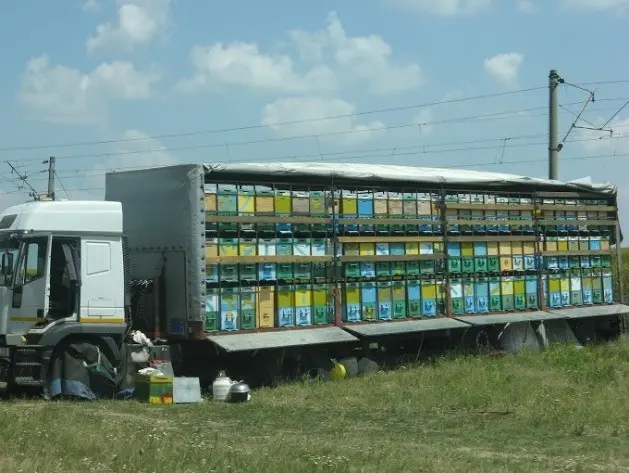
How else to make money on bees
Bee products as medicines continue to gain popularity today. A business can be built not only on the sale of honey, but also on the sale of other bee products:
- perga – 4000 rubles/kg;
- propolis – 2200-4000 rubles / kg;
- royal jelly – 200000 rubles / kg;Important! Just collected for 2 hours is placed in the refrigerator, otherwise it deteriorates. Processed at room temperature is stored for no more than 3 days, in the freezer – up to 2 years.
- tin homogenate – 30000 rubles/kg;Important! Drone milk can only be stored in the freezer, frozen immediately upon receipt. You can’t refreeze. The shelf life of the thawed homogenate is 3 hours.
- podmora;
- wax – 300-450 rubles / kg.
The main product of beekeeping is honey. The rest are by-products in business, and they are obtained from the hive in small quantities, except for bee bread, which is not much inferior to honey in quantity:
- wax – 1,5 kg;
- perga – 10-20 kg;
- propolis – no more than 80 g per season from a family of gray Caucasian bees;Attention! Other breeds produce propolis 2 times less.
- royal jelly – 450 g.
The exact amount of drone homogenate from the hive is unknown. But this product allows the beekeeper to “kill two birds with one stone”: to get additional income in the business and to reduce the number of varroa mites in the bee colony.
A large number of subpestilence is not worth rejoicing. This is an indicator of a sick family. Podmore – dead bees. At best, “worn out” working individuals, at worst – dead from the disease. Since the whole colony usually dies out in the second option, you can reduce losses in business by making a tincture of poison with vodka or alcohol. 100 ml of tincture cost 400 rubles.
Conclusion
Beekeeping as a business is a profitable investment. But, like any serious business, it requires full dedication. Also, beekeeping is a good option for a family business in the village.










